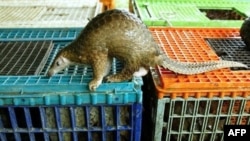llicit trafficking in wildlife, wildlife parts and products is big business, with conservative estimates placing the value of the illegal trade between $7 and $23 billion per year. This makes wildlife trafficking and related crimes some of the most lucrative illegal businesses. Indeed, organized poaching and wildlife trafficking by transnational crime syndicates and armed units has escalated to unprecedented levels, severely threatening the survival of some of the world’s most iconic and threatened species.
The Democratic Republic of Congo, or DRC, is one of the world’s seventeen mega-biodiverse countries and is home to over 400 species of mammals, more than 1,000 bird species, over 400 fish species, and in excess of 10,000 species of plants. This includes high number of endemic species - organisms that live nowhere else. Unfortunately, the country’s rich biodiversity, history of instability, and high level of corruption makes the DRC a top target for criminal networks seeking to move ivory, pangolin scales, rhino horn, and other illegal wildlife products from Africa to Asia.
The United States Government is working with the DRC to help protect its natural resources for the benefit of the Congolese people. In early November, U.S. law enforcement arrested two Congolese traffickers in the U.S. state of Washington. At the same time, Congolese officials in DRC’s capital city Kinshasa seized the traffickers’ stash of ivory, rhino horn, and pangolin scales worth about 3.5 million dollars. The operation was the result of a more than two-year cooperative effort between the State Department’s Diplomatic Security Service at the U.S. Embassy in Kinshasa, Homeland Security Investigations, and the Government of the DRC to shut down a wildlife trafficking operation.
In yet another step to disrupt wildlife trafficking networks, on December 13 the U.S. Department of State imposed visa restrictions on eight nationals from the Democratic Republic of the Congo for trafficking in wildlife.
“Wildlife trafficking is a serious transnational crime that threatens national security, economic prosperity, the rule of law, long-standing conservation efforts, and human health through the spread of zoonotic disease. The DRC is a major hub for trafficked wildlife and wildlife products moving from Africa to Asia and the Middle East,” said State Department Spokesperson Ned Price.
“This visa restriction policy is designed to further disrupt the movements and business of transnational criminal organizations involved in wildlife and timber trafficking by making it harder for them to smuggle illegal wildlife and timber,” he said.
“We are sending a clear message that wildlife and timber traffickers are not welcome in the United States.”














